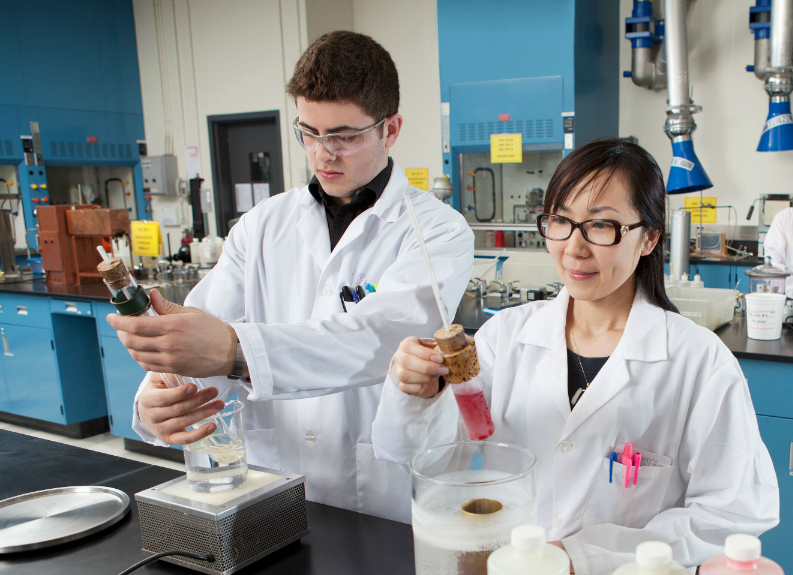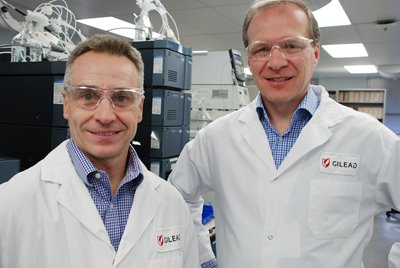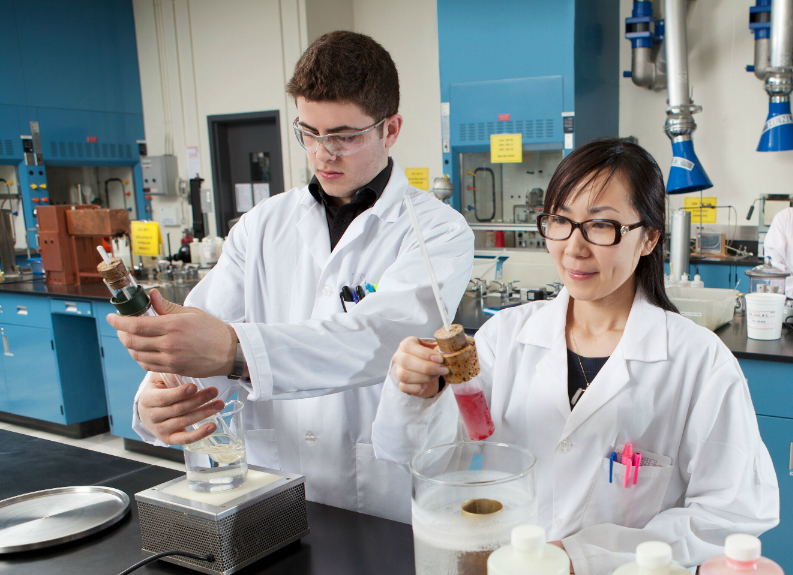
Gilead supports students to grow manufacturing of life-saving medicine
If someone had said to Kyle Kanuga when he graduated from NAIT’s Chemical Technology program in 1987 that he’d be where he is today, he would have laughed. He certainly wouldn’t have foreseen heading up a site environmental health and safety program at one of the world’s major pharmaceutical companies.
He didn’t start at the top, however. Fresh out of NAIT, he went to work for Raylo Chemicals, a local university spin-off pharmaceutical development company.
Kanuga started modestly in shipping and receiving, then went on to operations and, after a few years there, he took over environmental, health and safety duties.
Laporte plc had purchased Raylo Chemicals a few years earlier in 1988, and had started introducing Raylo to Laporte’s strong safety culture. Kanuga enrolled in an environmental, health and safety program after joining the department, and worked to improve the company’s operations from average to among the best in the pharmaceutical industry.
“People ask: ‘Why did Gilead choose to invest in Edmonton?’ There was a strong quality and safety systems culture.”
Kanuga remembers provincial environmental regulators at the time looking to what Raylo was doing for guidance and best practices. It was gratifying, he says.
Company needs skilled workforce
Raylo had started working with Gilead in the early 1990s, and by the time Gilead Sciences Inc. acquired the company in 2006, Raylo had a well-established history of doing outstanding work in the industry.
“You can make a difference here.”
 Raylo was a great fit, says Greg Klak, vice-president and General Manager of Gilead’s operations in Edmonton. Today, the company employs 380 people. About 60 of those are NAIT graduates.
Raylo was a great fit, says Greg Klak, vice-president and General Manager of Gilead’s operations in Edmonton. Today, the company employs 380 people. About 60 of those are NAIT graduates.
“People ask: ‘Why did Gilead choose to invest in Edmonton?’ There was a strong quality and safety systems culture,” Klak explains. “And the quality of the people had already been proven. They were capable and flexible.”
Klak says a research-intensive company needs access to a highly educated workforce and must be near a strong post-secondary sector. Moreover, it has be situated in a favourable cost and regulatory environment that allows for competition with other North American and European sites. But one of the most important factors, he points out, is cultural fit.
People like working for the company, he says, and they recognize they’re engaged in a globally important enterprise.
“You can make a difference here,” says Kanuga, by developing medicines to treat diseases.
Company has focused on treating infectious diseases
Both Klak and Kanuga say employees never lose sight of the bigger picture: Gilead is committed to discovering, developing and commercializing medicines in areas of unmet medical need.
Gilead focuses on medicines to treat HIV/AIDS, liver diseases, cancer, inflammatory and respiratory diseases and cardiovascular conditions. The company, and particularly the team in Edmonton, has played a key role in developing medicines for the treatment of hepatitis C.
The company recently completed a deal to acquire Kite Pharma and its CAR-T cell therapy, a promising cancer-fighting treatment that could move the field forward. Although early days, CAR-T therapies use the body’s own cells and immune system to combat cancers — and pharmaceutical manufacturers are pouring resources into the development of this new class of therapies.
The Edmonton site typically works on 10 clinical projects at any given time and plays an important role in supporting commercial active pharmaceutical ingredient manufacturing globally.
Strategic investment to grow operations
Gilead has invested more than $100 million for a second major manufacturing facility at its existing Edmonton site. It will be complete later this year. This follows closely on the heels of a $100 million investment to build two new lab buildings in 2015 and 2016 to expand its development operations.
“We are proud to support these organizations, and the important work they do in our community to improve people’s lives.”
Gilead has also invested in NAIT. Over the last several years, the company has donated funding for scholarships, bursaries and to the Chemical Technology program.
In the broader community, the company has been a long-time supporter of HIV Edmonton, and Capital Care, while the company’s charitable committee has directed funding to other charities chosen by the staff, for example, the Stollery Children’s Hospital, the Edmonton Humane Society, the Rainbow Society of Alberta and the Alzheimer Society of Alberta and NWT.
“We are proud to support these organizations,” explains Klak, “and the important work they do in our community to improve people’s lives.”
Published on March 29, 2018
Share this page:

Company invests in NAIT students to help improve lives
Gilead supports students who contribute to the manufacturing of life-saving medicine.
Share on Facebook